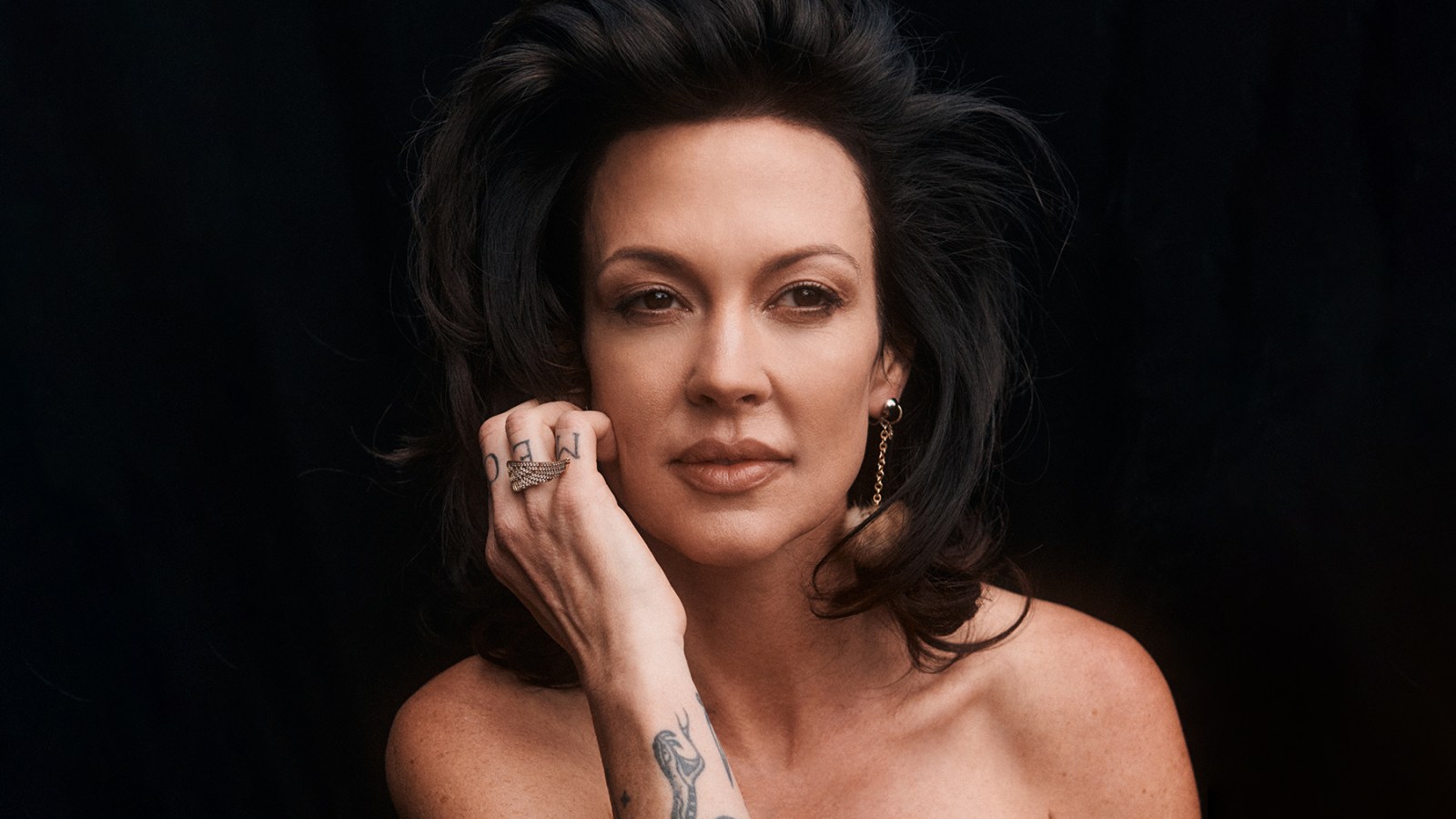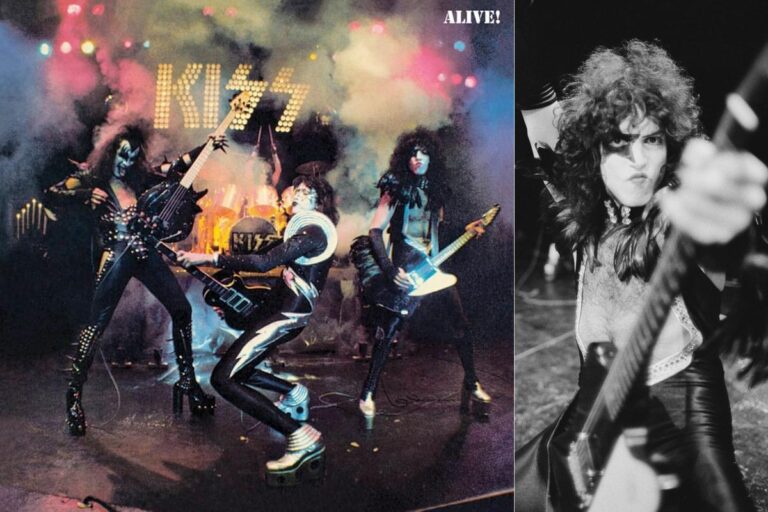After a long couple years, Amanda Shires is ready to re-emerge. Her grandmother and, more recently, her father, died. There have been moments of crying at the gym (“like the Taylor Swift song,” Shires says), and moments of feeling so numb she could no longer feel her body.
There’s also, of course, her divorce from singer-songwriter Jason Isbell, which was initiated in late 2023 and finalized earlier this year. The divorce, after 10 years of marriage, and the ensuing emotional fallout and period of personal growth and regrowth following it, is the subject of Shires’ new album, Nobody’s Girl, out Sept. 26.
But before she shares the album with the world, Shires wants to talk a bit about the period that led to this record. “The past two years of my life have made it to where I feel like I can talk about anything, at this point,” she says. “I have always used music as a way to explain what’s going on in my life to myself. And it was a big transition to go from, you know, having been in a marriage for a long time and to suddenly find that I’m not. It takes a lot of learning and self-reflection and, for me, a lot of time to process. In the processing, the music came about, and most all of that was a really hard, bad time. There were some moments of joy, as there tends to be, but we never focus on those.”
Shires recorded Nobody’s Girl in Nashville and Los Angeles, where she took trips for emotionally wrenching sessions with her collaborator Lawrence Rothman. “I didn’t want to put any of my friends in the middle of any of the fallout,” says Shires. “So, I went to L.A. and had a few friends come play on some sensitive material, friends who could put up with a woman crying on occasion, either out of joy or want for tacos or sadness.”
She wrote around 30 songs for the record, and some of the earliest ones were so raw, bitter and detailed in their excavation of emotions toward her ex-husband, that, as Shires puts it, “they ought to be for me and Jesus.”
But the songs that did make the record, after much back and forth, are still brutally honest and forthcoming, about both Shires’ marriage and the emotional sea-change in her life that its fallout kickstarted. There are songs about new flirtations and about global devastation, but mostly there are songs about unbearable heartbreak, regrowth, and survival. It is a record, as the album’s lead single, “A Way It Goes,” (out today) puts it, that is as much about the picking up of the pieces after her life-changing divorce as it is about the events that preceded that split.
Though there are a couple songs that get brutally detailed about the split (including one called, yes, “The Details”), Nobody’s Girl is also an exercise in narrative restraint and an album that says more by saying very little. “Don’t ask about the deep end,” as Shires sings in “A Way It Goes.”
Nearly everything has changed in Shires’ life, and she’s still getting used to much of it. “Even the feeling of not wearing your wedding ring is really strange,” she says. “You’re like, ‘At my age, wow, when all these people see my hand empty, what are they thinking of me?’ I don’t know! And why do I care?”
Calling her from her home in Tennessee, Shires recently spoke with Rolling Stone about her upcoming album, “A Way It Goes,” and what she’s learned about herself after one of the hardest periods of her life.
What was the spark for “A Way It Goes”?
It was everybody asking me what happened. Not everybody was just trying to get gossip: Some people genuinely cared and they want to know how you’re doing. I can’t tell if I’m trying to protect other people or myself, because you are responsible, in a way, or I feel responsible, if I dark somebody out too much, so I didn’t want to do that. Because there are feelings and there are things I said and did and probably shouldn’t have done — there’s the yelling and mad stage of whatever grief, anger, and bitterness is — so sometimes I did want to say all those things but I also know, at my core, I’m not that person. And I didn’t want to say that it wasn’t fucking hard, because it was, but my preference would be for you to see me back when I’m a whole person again. So, the whole start of that song were those questions. You feel a little bit like something in an aquarium people want to look at.
The MFA graduate in you must’ve felt proud when you came up with the phrase “leviathan of lonely.”
Oh, that was the exact feeling. My fear was, “Oh no, no one’s going to know what it means.” And then I was like, “Fuck it, I do, and it feels exactly like that.”
Where were you when you wrote the song?
I went to Los Angeles and sat with Lawrence, and the first thing we started working on was that bed for “A Way It Goes.” It just started coming out and I wasn’t expecting that because it has a hopefulness to it. I didn’t want to write any more songs at that point, but Lawrence said I still had a ways to go. I just went ahead and said “Okay” because I wasn’t in the best place in my life for decision making. There is a beautiful thing that Lawrence Rothman does as a friend, where they can see a person is struggling and knows that the way they get through these things is with their art. The songs that came from the [L.A. session with Rothman], we needed them for the record, but in the moment I didn’t realize that I needed them. The point was to finish working through the thoughts or psyche or place that I was in as a way to get me out of it. Like, “Come over here and drown with me in my studio, and I’ll make sure you’re still living when you get out.”
Were you listening to other classic divorce records while making Nobody’s Girl?
I wasn’t studying other records for the purpose of making this one. There’s a few things that got me through this stuff. That Jack White No Name album, I put that on repeat as loud as I could everywhere I went. I mean, on repeat enough to annoy the birds. And I listened to D’Angelo and the Vanguard’s [Black Messiah] over and over and over. Musically, it felt relaxing.
But I did have a pretty upfront conversation with Shooter Jennings because I was trying to take all the songs off the record that had anything to do with the breakup and that period of my life, because I didn’t want people to know that stuff, at first. It feels a little navel gaze-y. And Shooter was like, “You can’t just not put these songs on the record. That doesn’t make sense.” He was like, “Just call me your ‘divorce consultant’ for the record.” That was also probably during the time where I wasn’t in a good place to make good decisions about my work. It’s good to have friends for that, too. Me and Lawrence were arguing about this, so that’s how the Shooter conversation happened. Shooter is a good friend of mine from way back, and he was the tiebreaker without knowing it.
Speaking of other records, did you ever listen to Foxes in the Snow?
I put that record on. I appreciate the musicianship.
In the bio you wrote for the album, you write that the record is about you reclaiming your story. In recent years, had it felt like the Amanda Shires story was one you no longer had control over?
Well, I have a tendency in a relationship to give and give and give and give, because that’s the way, I guess, I show love. It’s not people pleasing; It genuinely makes me happy to give and help. But I also understand how the world works and how you can build a life and career as a woman in the music business and still not have anything to show for it, whether it’s the pay gap or being marketable or packageable, or whatever age you are. There’s no harm in putting eggs in a couple of baskets, and for the joy of a life you’re building, build something great with another person, you know? As far as the story goes, for a woman, you are identified as some kind of role you play: “She’s a mom”; “She’s a sister”; “She’s a divorcée.”
But the story of Amanda Shires, all that, any kind of career envy or jealousy never was a thing. I’ve been working since I was 15 for major legacy acts, and the Highwomen. I love the 400 Unit and everything, and anyway, there was never any of that. I’m not a dummy. But as far as the story, I don’t really know how it reads from the outside. On the inside I don’t feel like I lost control of it, I just felt like, in living it, in hindsight, I applied more of my own force and care into other projects. I would do that for myself, too, but obviously I would put myself last. But when you’re just your own self standing around, there’s nobody else to put first.
It sounds like you’re saying it could sometimes feel like your story was near the bottom of the pile of other stories you felt like you had to give yourself to?
Rightly or wrongly, I don’t know. But I chose [that], and I live with the consequences.
You’ve written about trust and discord and breakdowns in communication in relationships for a long time. I’m thinking of songs like “If I” and “Harmless.” Did you feel connected to your past work when writing about this turbulent period in your life?
It felt like, I’m writing about me and the things that draw up this call to put abstractions in a more visual way. It’s taking love, grief, loss, all those big words, and trying to show pictures of that. What is actually outside the name of the feeling? What does that look like? “If I” is just plain and simple. “Harmless” is very detailed, the details that happened on a very plain kind of evening. For this, I was blending together saying something plainly and then not fussing with every detail. This is going to sound silly, but I try to write things that are interesting to me and that I haven’t heard before and are actually real things in the moment: “A phased golden light/Rained down from the streetlight” — That’s just showing how the light falls on a person. I like to do that kind of thing. I feel like, on this record, I mixed the super detailed thing with the plain, simpler emotion together. Like in “A Way It Goes,” the chorus is so simple, but in some of the verses, there is that kind of imagery. I think that’s what I did on this one better than I’ve done before.
You sing about it quite eloquently on the new album, but what do you feel like you’ve learned about yourself throughout the making of this record?
I can actively name the feeling of anxiety when I feel it in my body, which I’ve never experienced so much of in my life. I guess I learned that it’s all manageable, even when you feel like it’s not. Also, even if you think things couldn’t possibly get worse, they definitely can. And I learned, no matter what happens in my future going forward, there’s no place in my life I can imagine not keeping my friends close to me. Nobody ever thinks anything’s going to end, and also nobody really expects people to take sides, but they do. I learned that I have to keep on putting myself first. And I learned that you can exist for six months on a diet of double stuffed Golden Oreos and rosé champagne. What else did I learn? I’ve learned that I can face armadillos on my own in the yard. All kinds of things.



